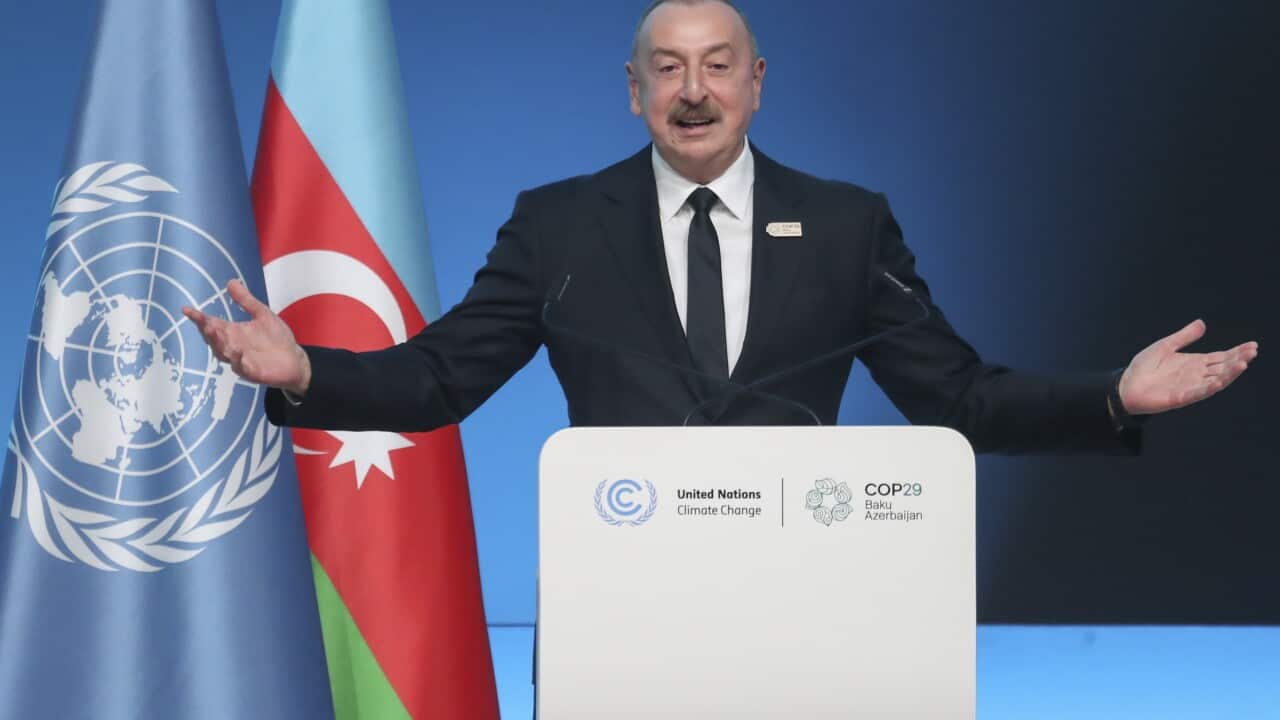TRANSCRIPT
With fossil fuel emissions rising again in 2024, climate scientists say the pace of climate action is moving too slowly.
And, COP29 host Azerbaijan is defending its emission records as critics spotlight corruption and its human rights record.
"We are in the final countdown to limit global temperature rise to 1.5 degrees Celsius and time is not on our side. COP29 must tear down the walls of climate finance. Developing countries must not leave Baku empty-handed. A deal is a must. And I'm confident it will be reached."
On day two of the United Nations Climate Summit in Azerbaijan, U-N Secretary General Antonio Guterres says the time to take serious action is right now.
New data released at the conference reveals that despite pledges made at the COP28 Summit in the UAE, planet-heating emissions from coal, oil and gas will rise by 0.8 per cent in 2024.
Mike O'Sullivan, a climate scientist from the University of Exeter, says the world is simply not doing enough.
"I feel that we need to massively increase ambition and actually just think outside the box of how we can change things, not be so tied to fossil fuel interests. And just think about how we can really change the status quo, not just tinker here and there. We need rapid change on a scale that we've never seen before. And I feel like that message cannot be said enough."
Day one of the summit saw an agreement reached on new rules regulating a carbon credit market, which will allow countries to purchase carbon offset credits in a global market.
But, Senior Attorney from the Centre of International Environmental Law, Erika Lennon, says she doesn't believe the carbon market will function properly.
"I have a lot of concerns about how rushed this is. One of the things that was supposed to happen was that the supervisory body for the Paris Agreement's carbon market was really supposed to come up with these standards and bring them to the COP for review. Last year we saw them do this and they weren't good enough and frankly they haven't made many improvements but have been able to put them through and say they're adopted and parties have decided to go along with that."
Meanwhile, the President of Azerbaijan, Ilham Aliyev, has lashed out at Western media for what he calls a coordinated and well-orchestrated campaign of slander and blackmail against his country.
The host of the United Nations Climate conference, COP29, has been named by N-G-O Freedom House as the most authoritarian country to ever host the summit.
President Aliyev, says attacks on his country are nothing more than Western hypocrisy.
"Azerbaijan's share in global gas emissions is only 0.1 per cent. I have to bring these figures to the attention of our audience because right after Azerbaijan was elected as a host country of COP29, we became a target of a coordinated, well-orchestrated campaign of slander and blackmail, Western fake news media and so-called independent NGOs and some politicians, as if we're competing in spreading disinformation and false information about our country."
The Azerbaijani President is correct in stating that Azerbaijan's share of global emissions is relatively low.
Critics of the host country however argue that their concerns are not merely related to Azerbaijan's emissions or even their historic reliance on fossil fuels.
Rather, criticism surrounds the government itself, which opposition activists say is targeting free speech and anti-corruption efforts in the country.
Georgian civil activist Tamar Jakeli says there are major concerns about what she describes as growing authoritarianism in the region.
"We are protesting the rising authoritarianism in the region, as well as specifically authoritarianism in Azerbaijan. Right now, the world's biggest climate conference is starting in Baku, and Azerbaijan has 300 political prisoners. And in Georgia, a similar kind of authoritarian regime is threatening Georgia's society with repressions. So yeah, we are here united against authoritarianism and for social justice."
Giorgi Gogia is the Associate Director of the Europe and Central Asia division of Human Rights Watch.
Speaking in the lead up to the conference, he told SBS that Azerbaijan has a history of using major events to cover up human rights abuses.
"Azerbaijan is using these mega events to polish, its international image and to cover up, it's abysmal rights record. And first time we tried to use this mega event in 2012, which was a locally well-known kind of song contest Eurovision. It just saw that basically this attempt to whitewash its international image backfired because the journalists who came to cover the song contest, they also saw the brutality of police abuse, for example, when there were small protests organised by independent groups, they were immediately cracked down and it was easy to expose the violation."
Organisations like Transparency International say that Azerbaijan's ruling family uses major events for their own financial gain, with their own private companies boosted by the influx of visitors.
Within the COP29 Official Partner list, at least six of the summits major partner companies are owned either in full or in part by the ruling Aliyev family.
The COP29 President, Mukhtar Babayev, as well as several other members within the official organising committee, are either government loyalists or work for the state oil company SOCAR.
Giorgi Gogia says after journalists exposed rights abuses at Eurovision, Azerbaijan made sure that ahead of the next major event it hosted, dissenting voices were silenced.
"Next time in 2016 it invented actually and hosted this for the first time ever, so-called European Games, European Olympics, and basically it made sure that by 2016 all the critical voices were silenced."
COP29 will run until the 22nd of November.













